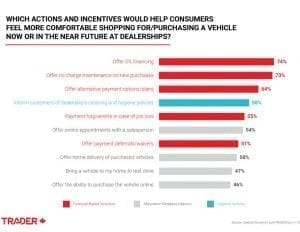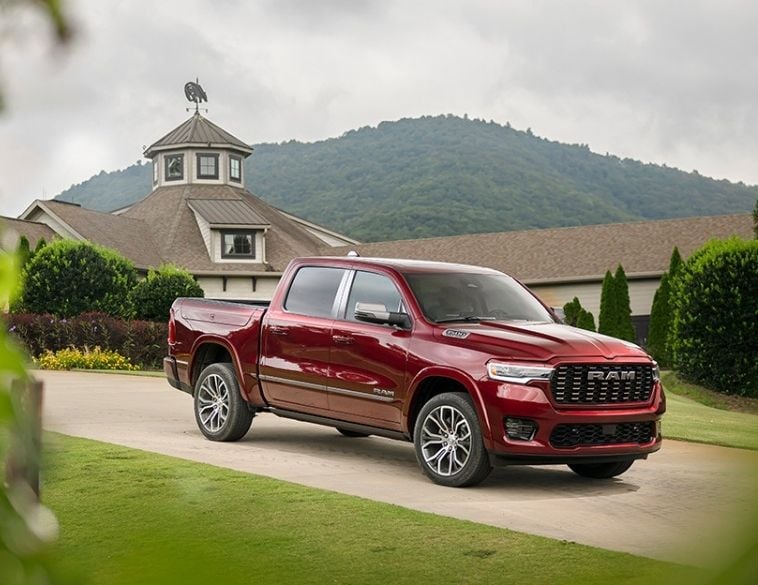During COVID-19, the idea of remote selling has gained significant traction, but how will it fare long-term?
Are consumers willing to actually purchase a vehicle without ever setting foot inside the dealership? It’s a question that’s been at the forefront of auto retailing for more than a decade. Yet, the concept of an entirely remote purchase experience is something that up until a few months ago had yet to really gain momentum.
Incentives to purchase
With the onset of COVID-19 and dealers forced to close their showrooms in March and April, the idea has become more appealing. In fact, during a two-week period at the end of April and beginning of May, TRADER Corporation surveyed over 500 visitors to the autoTRADER.ca website and asked them to identify specific factors that would provide incentives to purchase a vehicle either today, or in the near future.
The study revealed some interesting findings.
Firstly, that zero-percent financing was the most popular incentive (74% of respondents), closely followed by no-charge maintenance packages (73%) and alternative payment plans (64 %).
Secondly, that more than half of those surveyed believed dealers should inform consumers of their sanitization and hygiene policies (58 percent) and thirdly, when it comes to the actual sales process and vehicle delivery, close to half of those surveyed said they would welcome alternative shopping methods. These include:
- Online appointments with a salesperson (54 %)
- Home delivery of purchased vehicles (50 %)
- Bringing a vehicle to their home to test drive (47 %)
- The ability to purchase the vehicle online (46 %)
Additionally, a key factor in the COVID-19 era has been the emergency of deferred payment plans or loan forgiveness as many consumers struggle with economic uncertainty and job loss. In fact, of the more than 500 people surveyed, 51 % said they would be enticed to buy a vehicle—provided some kind of payment deferral plan was offered.
So, based on findings like this, does the era of social distancing mean that we are closer than ever to witnessing remote vehicle selling?
Greater anxiety
Ian MacDonald, Vice President, Strategic Marketing at TRADER notes that the onset of COVID-19 has definitely impacted consumer behaviour patterns and that the growing importance of payment forgiveness—combined with the popularity of zero-percent financing and no-charge maintenance—suggests that we’ve seen a very significant increase in anxiety around personal finances.
MacDonald also notes that for dealers, this anxiety is expected to be further impacted by a glut of used cars entering the market this year as leases expire and fleets, including municipalities and rental companies look to liquidate their inventories.
Based on these factors, a perfect storm could result whereby consumer spending anxiety, coupled with a swell in used vehicle inventory puts downward pressure on prices and as a result, the ability for dealers to make a profit. Under that scenario, it is highly likely that many consumers, even if they are considering shopping for a new vehicle will probably wait and see what happens over the next 3-5 months.
Savvy dealers however; can potentially use this to their advantage. By combining incentives such as zero-percent financing, no-charge maintenance and payment deferral with peace of mind strategies such as online sales appointments, home test drives, online purchasing and home delivery, in theory it creates a win-win, allowing dealers to stand out in the market place and build consumer confidence by not only having the ability to conduct a healthy number of transactions now —but also develop innovative sales processes—while stealing a lead on the competition.
Hygiene policies are a key part of the peace-of-mind strategy too. According to MacDonald, while the TRADER survey didn’t delve too deeply into how dealers are actually sanitizing vehicles and performing COVID-19 health and safety protocols, it did reveal the comfort level of consumers as it relates to the type of hygiene measures that are put in place.
“A good comparison for this,” says MacDonald, “is the grocery store. People need to line up outside at 2 metres (6-ft) apart, carts must be used and sanitized for each customer and staff must take safety measures such as wearing masks and gloves, as well as servicing customers from behind glass partitions.”
So based, on that, he says that dealers who adopt similar measures such as thoroughly cleaning vehicles, wearing masks and conducting transactions at a distance are all likely to increase consumer confidence in the sales process.

Greater awareness
According to MacDonald, there’s no question that COVID-19 and the ensuing lockdowns have significantly increased awareness related to remote selling, as well as the digital and virtual tools available to facilitate it.
Yet he notes there are some key factors to consider. Firstly, that at present, and likely for the foreseeable future, it’s not about creating an entirely digital or virtual sales experience, but rather creating a seamless transition between online and offline processes.
‘You can set the foundation for the transaction online,” says MacDonald, “but there are offline elements that you can leverage to make the experience more convenient and more efficient for the consumer, such as the home test drive and delivery process. The question then becomes, how do you blend them all together?”
Traditionally, vehicles have been somewhat of a visceral purchase, with consumers wanting to see the vehicle, to examine it, to sit in it and drive it before committing to purchase. Despite the growing number of online sales tools available to dealers, especially over the last decade, that aspect hasn’t gone away. Now, with COVID-19, it’ll be interesting to see what happens as the economy reopens.
“We’ll have to see just how strong the visceral aspect of a vehicle purchase remains,” says MacDonald, who acknowledges that while at present—it’s still too early to tell how many COVID-19 induced consumer behaviour patterns will remain after restrictions have eased—there is still definitely a chance that the shift toward conducting more and more of the sales process remotely will continue, requiring a growing need for tools and solutions to support it such as TRADER’s Remote Selling Suite platform.
This is a collection of tools that’s designed to help dealers enhance their online retail operations by allowing them to conduct daily sales operations virtually while at the same time connecting them with millions of Canadians across the country who are searching for their next vehicle through the autoTRADER.ca portal.
The suite includes features such as online appointment scheduling, real time chat, home test drive and delivery options, as well as a Reserve It! vehicle sales deposit tool. “The idea is to encourage users to move down the sales funnel, by promoting communication and laying the foundation towards a transaction, as opposed to having the consumer simply being stuck at the browsing stage of their journey,” says MacDonald.
Inventory management
Ultimately, the key factor for dealers moving forward, is going to be their ability to not only create a seamless purchase experience by combining online solutions and traditional experiences but do so in lockstep with effective inventory management, especially as it is likely to be some time before both the new and used vehicle markets stabilize.
And for dealers that already subscribe to platforms such as TRADER’s own marketplace, having a complimentary arsenal of Remote Selling Solutions is only likely to enhance their business as they adjust to operating in a post COVID-19 world.



